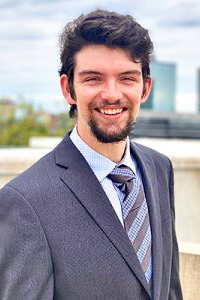 Since 2020, Volkswagen Group of America has awarded several fellowships to University of Tennessee, Knoxville, graduate students. The fellowships are one component of a partnership that also created the automotive company’s first North American Innovation Hub at the UT Research Park at Cherokee Farm.
Since 2020, Volkswagen Group of America has awarded several fellowships to University of Tennessee, Knoxville, graduate students. The fellowships are one component of a partnership that also created the automotive company’s first North American Innovation Hub at the UT Research Park at Cherokee Farm.
Doctoral student Edward “Joey” Michaud is one of the most recent recipients of the fellowship, which not only includes funding but also an opportunity to gain real-world experience working with Volkswagen on industrially relevant research and development. We sat down with Michaud to discuss his experience.
What are you studying?
I am studying the way different shapes can absorb energy during car crashes (think “crumple zones”). Using highly specialized and optimized simulation software, I can take complex shapes and predict what would happen if we hit it super hard. The funny thing about this study is that we don’t want the “strongest” material. If you have super rigid crumple zones, they won’t exactly crumple. The first phase of this project will be to investigate already-existing shapes and evaluate them for which would absorb the most energy in a crash. The next phase will be to train an artificial intelligence program to make up totally new shapes that perform better than any human could realistically design on their own.
What UT professors and VW professionals are you working with?
On the UT side, I work technically with my advisor, Professor Dayakar Penumadu, and various other individuals as needed for trainings and such. These people include our postdoctoral researcher in the group, Stephen Young, and graduate students Andrew Patchen and Zach Arwood. I’ve received some great help from one of our undergraduate students, Logan Goodbred.
On the Volkswagen side of things, we do a lot of more general collaboration in our office—mostly talking and sharing ideas about each other’s projects. It’s really nice to field questions from colleagues that aren’t directly involved in our project as it allows for novel questions that, in my experience, I wouldn’t have thought of on my own. Therefore, I can attribute this to each of my colleagues here in the office. I also work a lot with some folks from our California office. They are doing the artificial intelligence coding, and their names are Wesley Teskey, Alina Negoita, and Megan Hardy. Due to the company being so global, this distance has very little effect on our ability to get work done, and I really enjoy having their expertise as I start my own AI journey.
Have you had to travel for your research, or do you plan to travel to complete your research or degree?
I grew up in Knoxville and haven’t yet made my way out of the country—in part due to the relative newness of my project. Volkswagen offers many opportunities to travel and share our ideas, such as attending large research events in Wolfsburg, Germany. I have gone on smaller trips for tech scouting in Huntsville, Alabama, and we have gone on another trip to the VW California office to meet with some of my coworkers on my project. They have also taken some trips out here to our side of the country. Further, there are even opportunities to study in Germany. Recently a 3-month stay was proposed to me by one of my superiors in the company. I’m not sure whether or not I will take this opportunity. My recent fiancée might want to wait for the opportunity in both our careers to go with me.
When do you estimate you will graduate, and what will be the title of your degree?
I am about to finish my first year in my current position at VW and my new department at UT. I completed one year of master’s degree work in chemical and biomolecular engineering, which was also my undergraduate degree, but I quickly found that it didn’t align with my research interests. Since then, I have changed focus to engineering science and mechanics, which allows me to grab courses from many different engineering departments rather than sticking to only one. Therefore, I would expect to graduate in 3–4 years with a Doctorate in Engineering Science and Mechanics.
Do you have any plans after graduation?
One of the great things about this program is the (very likely) opportunity to get a job offer after we earn our degree. At this point in time, I’m very excited about that prospect. My partner has spent some time learning abroad in Germany and would love to spend some time living there with me. If I were to join Volkswagen as a full-time employee, there are already pathways to get transferred for approximately three years to another location. Working at the main headquarters in Wolfsburg would be a great career opportunity as well as a lot of fun experiencing life outside of the US.
Do you have any additional comments about the value of the UT-VW fellowship?
I’m definitely more of an employee than the average graduate student. I am in business meetings and not only focus on my research but have to make arguments for why my project is a good investment for the company. This has its pros and cons. While I may not be able to put quite as much time into research as a “normal” graduate student, I’m likely more prepared for life afterwards than I would be otherwise. I’m very happy with the position I was offered, and I’m really looking forward to the things I will accomplish here.